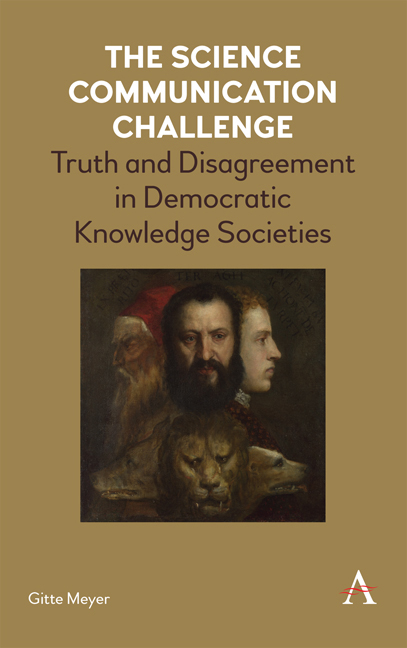Book contents
5 - A Political Category of Science Communication
Published online by Cambridge University Press: 21 June 2018
Summary
Sapere aude is an enlightenment motto of rich ambiguity, reminding us of the multiple and to some extent conflicting ideas of enlightenment that made the Enlightenment era so fertile. Because of the ambiguity, the motto is not easily translated from the Latin. Should it be translated into ‘dare to know’? Or should it rather be translated into ‘dare to make use of your own reason’ or just ‘dare to think’?
None of those very different translations – all in use – is false and none is universally correct. They are equally valid. Together, they mark an interpretational space. Daring us to know and to think, the space is useful to reflections and exchanges about how to communicate about science. When should predominantly didactic approaches, in the sense of ‘dare to know’, be used? When would dialectical approaches, in the sense of ‘dare to think’, be more suitable? There is tension between those understandings and approaches, but they are not opposed in a straightforward way. Rather, they are complementary. But we do have to think hard, from one case to another, to strike a proper balance.
Frequently, there is good reason to proceed along predominantly didactic lines, emphasizing the dissemination aspect of science communication, the sheer transportation of scientific knowledge from a group of knowers to others who lack and might benefit from that knowledge. But more and more often, knowledge claims concern huge and inexact societal questions, fraught with the kinds of uncertainty and complexity – including conflicts of interest – that are the hallmark of political issues proper and with ample room for different, reasonable assessments. Science- related public affairs tend to come with such features. Why not, then, proceed along predominantly dialectical lines in those cases?
The introduction of a political category of science communication, stressing the discussion aspect of science communication, would constitute a deviation from mainstream understandings of the mores and means of science communication. Some might even consider it a dangerous deviation and a threat to the authority of science.
- Type
- Chapter
- Information
- The Science Communication ChallengeTruth and Disagreement in Democratic Knowledge Societies, pp. 135 - 164Publisher: Anthem PressPrint publication year: 2018

